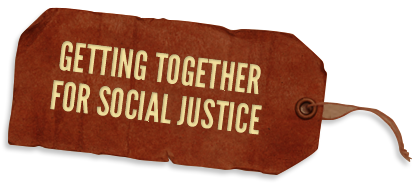
Photo Marc Oliver Jodoin via Unsplash
I GREW UP BELIEVING THAT ALL AMERICANS have equal opportunity to succeed because there is a level playing field and affirmative action was no longer necessary. Since then, I have found this exercise useful to challenge our common assumptions of equal access.
Everyone starts out standing on a line in the middle of the room facing one wall. Participants are told that the line is the starting line for a race to get some well-paying jobs, which they need to take care of their families. But before the race begins the starting positions will be adjusted via the following exercise. Participants are asked to silently take a step forward or backward, depending upon given instructions and if a statement of social status applies to them. They may decide for themselves whether the statement applies, and, as much as possible, keep their steps the same size throughout the exercise.
Explain that the exercise will be done in silence to allow participants to notice the feelings that come up during the exercise and to make it safer for all participants.
Begin the Exercise
1. If your ancestors were forced to come to this country or forced
to relocate from where they were living, either temporarily or
permanently, or restricted from living in certain areas, take one
step backward.
2. If you feel that your primary ethnic identity is “American,”
take one step forward.
3. If you were ever called names or ridiculed because of your
race, ethnicity or class background, take one step backward.
4. If you grew up with people of color or working class people
who were servants, maids, gardeners or babysitters in your
house, take one step forward.
5. If you were ever embarrassed or ashamed of your clothes, your
house, or your family car when growing up, take one step
backward.
6. If you have immediate family members who are doctors,
lawyers, or other professionals, take one step forward.
7. If pimping and prostitution, drugs, or other illegal activities
were a major occupational alternative in the community where
you were raised, take one step backward.
8. If you ever tried to change your physical appearance,
mannerisms, language or behavior to avoid being judged or
ridiculed, take one step backward.
9. If any women in your family, including yourself if you are
female, were ever physically or sexually assaulted in any way
by men in your family, take one step backward.
10. If you studied the history and culture of your ethnic ancestors
in elementary and secondary school, take one step forward.
11. If you started school speaking a language other than English,
take one step backward.
12. If your family had more than fifty books in the house when you
were growing up, take one step forward.
13. If you ever skipped a meal or went away from a meal hungry
because there wasn’t enough money to buy food in your family,
take one step backward.
14. If you were taken to art galleries, museums or plays by your
parents, take one step forward.
15. If one of your parents was ever laid off, unemployed or
underemployed not by choice, take one step backward.
16. If you ever attended a private school or summer camp, take one
step forward.
17. If you received less encouragement in academics or sports
from your family or from teachers because of your gender, take
one step backward.
18. If you or your family ever had to move because there wasn’t
enough money to pay the rent, take one step backward.
19. If you were told by your parents that you were beautiful, smart,
and capable of achieving your dreams, take two steps forward.
20. If you were told by your parents that you were beautiful, pretty
or good looking and therefore what you thought or did wasn’t
important, take one step backward.
21. If you were ever discouraged or prevented from pursuing
academic or work goals, or tracked into a lower level because
of your race, class or ethnicity, take one step backward.
22. If your parents encouraged you to go to college, take one step
forward.
23. If you were ever given less support than the boys in your
family for going to college or pursuing work goals because of
your gender, take one step backward.
24. If you grew up in a single parent household, take one step
backward.
25. If, prior to your 18th birthday, you took a vacation outside of
your home state, take one step forward.
26. If you have a parent who did not complete high school, take
one step backward.
27. If your parents owned their own house, take one step forward.
28. If you commonly see people of your race or ethnicity on
television or in the movies in roles that you consider to be
degrading, take one step backward.
29. If you ever got a good paying job or a promotion because of a
friend or family member, take one step forward.
30. If you were ever denied a job because of your race or ethnicity,
take one step backward.
31. If you were ever denied a job, paid less for comparable work or
had less qualified men promoted over you because of your
gender, take one step backward.
32. If, as a white person, you ever worked in a job where people of
color held more menial jobs, were paid less or otherwise
harassed or discriminated against, take one step forward.
33. If you were ever paid less, treated less fairly, or given harder
work than a white person in a similar position because of your
race or ethnicity, take one step backward.
34. If you were ever mistrusted or accused of stealing, cheating or
lying because of your race, ethnicity or class, take one step
backward.
35. If you ever inherited money or property, take one step forward.
36. If you primarily use public transportation to get where you
need to go, take one step backward.
37. If you generally think of the police as people that you can call
on for help in times of emergency, take one step forward.
38. If you have ever been stopped by police because of your race,
ethnicity or class, take one step backward.
39. If you ever felt afraid of violence directed toward you because
of your race, take one step backward.
40. If, in general, you can avoid those communities or places that
you consider dangerous, take one step forward.
41. If you ever felt uncomfortable or angry about a remark or joke
made about your race or ethnicity but it wasn’t safe to confront
it, take one step backward.
42. If you or close friends or family were ever a victim of violence
because of your race or ethnicity, take one step backward.
43. If your parents did not grow up in the United States, take one
step backward.
After the last statement everyone is asked to freeze in place,
without looking around, and to notice briefly where they are, who
is in front of them and who they can and cannot see.
Then they are asked to look around and notice briefly where they
and everyone else is. What feelings do they have and what patterns
do they notice?
Then people are told that they are in a race to the front wall for
some well paying, good jobs. They should imagine that they need
one of those jobs to support themselves and their families.
When told to, they are to run towards the wall as fast as they can.
The first few to the front wall will get those jobs. Quickly say,
“Ready, set, go,” to start the race—and get out of the way!
Group discussion
Have participants pair up and talk for a few minutes about
whatever feelings came up during the exercise.
This exercise works well as a follow-up to the power chart to make
concrete what differences exist in power means. It introduces class
and race and the intertwining of both. And it can raise issues of
individual achievement, “level-playing field,” affirmative action,
and the different reactions people have to an unequal system. (For
example, given where they ended up in the room, how did that
affect how hard they ran towards the front wall? Did they run at
all?) The exercise is also a good setup for the economic pyramid
exercise and a discussion of the economic system.
After the exercise it is important to point out that the race actually
takes place in a stadium. The winners of the race were declared
before the race started. The ruling class is sitting in the stands
watching the whole event with amusement. They don’t have to race
because they’ve been awarded the very best, most high paying jobs
before the race even began. In fact, they’ve been betting on who
would run for those jobs the fastest. How does this added
information affect people’s commitment to the race? To how hard
they might run? To their sense of justice?
(c) 2002 by Paul Kivel.
Please send comments, feedback, resources, and suggestions for distribution to paul@paulkivel.com. Further resources are available at www.paulkivel.com.
All articles may be quoted, adapted, or reprinted only for noncommercial purposes and with an attribution to Paul Kivel, www.paulkivel.com. Creative Commons Attribution – Noncommercial 3.0 United States License. To view a copy of this license, visit here.
